All About Collagen
Collagen is the most abundant protein in the human body, making up a significant portion of our connective tissue, including skin, tendons, ligaments, and bones. Thankfully, the body naturally produces collagen, as its primary role is to provide structural support, strength, and elasticity to these tissues, ensuring the body functions optimally. This fascinating protein goes beyond its structural importance. Let’s delve deeper into the world of collagen and explore its intricate details.What is Collagen?
Collagen is a complex protein comprising essential amino acids, particularly glycine, proline, and hydroxyproline. This indispensable amino acid balance is necessary for collagen synthesis, ensuring the proper formation and stability of the protein. The unique structure of collagen, with its triple-helix arrangement, is what gives it its remarkable strength and stability. Furthermore, collagen is not a single entity but rather a family of proteins. Among the various types of collagen found in the body, type I, II, and III are the most prevalent. Each type has distinct functions and is present in specific tissues. Type I collagen, for example, is abundant in the skin, bones, tendons, and ligaments, providing them with the necessary strength and support. Type II collagen, on the other hand, is primarily found in cartilage, contributing to its elasticity and shock-absorbing properties. Type III collagen is often found alongside type I collagen, enhancing its structural integrity. Understanding the different types of collagen allows us to appreciate the diverse roles it plays in maintaining our overall health and well-being.The Role of Collagen in the Body
Collagen plays a crucial role in maintaining the health and integrity of various body tissues. Its presence in the skin is of particular importance, as it contributes to its firmness, elasticity, and hydration. As we age, collagen production naturally declines, leading to visible signs of aging, such as wrinkles, sagging skin, and dryness. Therefore, supporting collagen synthesis becomes essential in maintaining youthful and vibrant skin. Collagen is not limited to the skin; it also plays a vital role in supporting the flexibility and mobility of joints. In joints, collagen acts as a cushion, preventing bones from rubbing against each other and reducing friction. This cushioning effect is especially crucial in weight-bearing joints, such as the knees and hips, where collagen helps absorb shock and distribute forces evenly. Moreover, collagen contributes to the overall musculoskeletal health by promoting the regeneration and repair of connective tissues. Whether it’s healing a tendon injury or recovering from a fracture, collagen is involved in the intricate process of tissue remodeling, ensuring proper healing and recovery. Furthermore, collagen is not only beneficial for the skin and joints but also for other body tissues. It supports the health of blood vessels, promoting efficient circulation and nutrient delivery throughout the body. Collagen is also present in the cornea of the eye, contributing to its transparency and structural integrity. As we continue to unravel the secrets of collagen, its importance becomes even more evident. It is not merely a structural protein but a vital component that influences various aspects of our health.The Health Benefits of Collagen
The consumption of collagen has been associated with several health benefits. Let’s explore some of the key advantages it offers:Skin Health and Collagen
When it comes to the skin, collagen is a beauty secret worth knowing. As we age, collagen production naturally declines, leading to wrinkles, sagging skin, and decreased elasticity. Supplementing with collagen has shown promising results in improving skin hydration, elasticity, and overall appearance. Collagen is responsible for maintaining the structure and strength of the skin. It forms a network of fibers that provide support and elasticity. When collagen levels decrease, the skin becomes thinner and more prone to damage. This can result in the formation of fine lines, wrinkles, and sagging. By supplementing with collagen, you can replenish the levels of this vital protein in your body. This can help improve the moisture content of your skin, making it appear plumper and more youthful. Collagen also stimulates the production of other proteins, such as elastin, which further enhances the skin’s elasticity. Furthermore, collagen has been shown to promote the production of new skin cells, which can help improve the overall texture and tone of your skin. It can also aid in reducing the appearance of scars and stretch marks.Collagen for Joint and Bone Health
Collagen acts as a building block for ligaments, tendons, cartilage, and bones, making it essential for joint health and mobility. Studies have shown that collagen supplementation can help reduce joint pain and improve symptoms of conditions such as osteoarthritis. As we age, the cartilage in our joints starts to deteriorate, leading to stiffness, pain, and reduced mobility. Collagen helps to maintain the integrity of the cartilage, providing cushioning and reducing friction between the bones. It also stimulates the production of synovial fluid, which lubricates the joints and improves their flexibility. Collagen supplementation has been found to reduce inflammation in the joints, alleviating pain and swelling. It can also help promote the regeneration of cartilage, which can slow down the progression of joint degeneration. In addition to its benefits for joint health, collagen is also crucial for maintaining strong and healthy bones. Collagen provides the structural framework for bone mineralization, ensuring that calcium and other minerals are properly deposited in the bones. This helps to prevent conditions like osteoporosis and fractures.Collagen’s Impact on Heart Health
Emerging research suggests that collagen may have a positive impact on heart health. Collagen provides structural support to blood vessels, reducing the risk of cardiovascular conditions. Additionally, collagen peptides may help lower cholesterol levels and improve overall lipid profile. The walls of our blood vessels are made up of collagen, which gives them strength and elasticity. Collagen helps to maintain the integrity of the blood vessels, preventing them from becoming weak or damaged. This can reduce the risk of conditions like atherosclerosis, where plaque builds up in the arteries, leading to heart disease and stroke. Collagen peptides, which are smaller fragments of collagen, have been found to have cholesterol-lowering effects. They can help inhibit the production of cholesterol in the liver and increase its excretion from the body. This can help improve the balance of lipids in the blood and reduce the risk of heart disease. Furthermore, collagen has been shown to have antioxidant properties, which can help protect the heart and blood vessels from oxidative stress and inflammation.How Much Collagen Do We Need?
The amount of collagen needed varies based on individual factors such as age, gender, weight, activity level, and overall health. Experts have established general guidelines for collagen intake to help individuals maintain optimal health. These guidelines take into consideration various factors that can influence collagen needs.Recommended Daily Intake of Collagen
Research suggests that a daily collagen intake of at least 2.5-5 grams is necessary to experience the potential health benefits. This dosage may help support skin elasticity, joint health, and overall body composition. However, it is important to note that individual needs may vary. Factors such as age, gender, weight, activity level, and overall health can impact the amount of collagen needed. For example, athletes or individuals with high levels of physical activity may require a higher collagen dosage to support joint health and recovery from exercise-induced stress on the body. Additionally, certain health conditions or concerns may warrant a higher collagen intake. For instance, individuals with conditions affecting the skin, such as eczema or psoriasis, may benefit from increased collagen consumption to support skin health and healing. It’s important to consult a healthcare professional to determine the appropriate collagen intake for your specific needs. A healthcare provider can assess your individual circumstances and provide personalized recommendations based on your age, gender, weight, activity level, and overall health.Factors Affecting Collagen Needs
Collagen needs can vary based on individual circumstances. In addition to the factors mentioned above, there are other considerations that can influence collagen requirements. Dietary factors play a significant role in collagen production and maintenance. Consuming a diet rich in collagen-boosting nutrients, such as vitamin C, zinc, and copper, can support the body’s natural collagen synthesis. On the other hand, a diet lacking these nutrients may impair collagen production and lead to collagen depletion. Environmental factors, such as sun exposure and pollution, can also affect collagen needs. Ultraviolet (UV) radiation from the sun can break down collagen fibers in the skin, accelerating the aging process. Protecting the skin from excessive sun exposure and minimizing exposure to environmental pollutants can help preserve collagen levels. Furthermore, certain lifestyle choices, such as smoking and excessive alcohol consumption, can negatively impact collagen production and contribute to collagen degradation. These habits can impair the body’s ability to produce and maintain healthy collagen levels. While the recommended daily intake of collagen is generally around 2.5-5 grams, individual needs may vary based on factors such as age, gender, weight, activity level, and overall health. It is important to consider these factors and consult with a healthcare professional to determine the appropriate collagen intake for your specific needs. By incorporating collagen-boosting nutrients into your diet and adopting a healthy lifestyle, you can support your body’s natural collagen production and maintain optimal health.Is 500mg of Collagen Enough?
Now, let’s explore the efficacy of a 500mg collagen dosage and whether it can deliver the desired health benefits.Analyzing the Efficacy of 500mg Collagen Dosage
While 500mg of collagen may seem like a small dosage, it can still provide some benefits. However, the optimal dose for achieving significant results may lie beyond this amount. Depending on your health goals, it may be necessary to consider higher dosages within the recommended range. When it comes to collagen supplementation, dosage plays a vital role in determining its effectiveness. While 500mg may be suitable for some individuals, it may not be sufficient for others who require more substantial benefits. Factors such as age, overall health, and specific health concerns should be taken into account when determining the appropriate collagen dosage.What to Look for in Collagen Supplements
In addition to proper dosage, the quality of a collagen supplement is also important. Look for products that contain hydrolyzed collagen, as this type of collagen has been broken down into smaller peptides for better absorption in the body. Additionally, opt for sources that provide grass-fed or organic bovine collagen whenever possible. This ensures a cleaner product with fewer impurities. When shopping for a collagen supplement, it’s also important to check the label carefully and ensure that any additional ingredients are natural and non-toxic. Some products may contain artificial colors, flavors, or preservatives that can be harmful to your health. Avoid these products and opt for natural options with minimal ingredients. Finally, look for reputable brands that have been tested for safety and efficacy.The Final Word on Getting Enough Collagen
Getting the right dosage of collagen is essential to enjoy its health benefits. Whether a 500mg dosage is enough depends on individual circumstances, including age, overall health, and specific health needs. Always consult with a healthcare professional to determine the right dosage for you. When selecting a collagen supplement, prioritize quality, opt for hydrolyzed collagen from clean sources, and ensure all additional ingredients are natural. By doing so, you give your body the best chance of effectively utilizing collagen to support skin, bone, and joint health.Organixx Clean Sourced Collagens blend contains five types of collagen from four sources. What’s more, it’s combined with targeted nutrients such as zinc, vitamin C, and vitamin B6 which specifically enhance the bioavailability and potency of collagen. Clean Sourced Collagens is formulated from the ground up to enhance and support your body’s natural ability to heal and rebuild itself from the INSIDE out.

In the health and wellness industry collagen is a very popular topic. Collagen for skin aging; collagen for healthy hair and nails; collagen for joint pain; collagen for digestive issues; and more recently, collagen for weight loss.
How can one word be a part of so many varying areas of health? Well, quite simply, collagen is a powerhouse protein when it comes to our wellbeing.
What do the experts have to say with regards to collagen for weight loss? Does it really work? Why is it beneficial for weight loss? How much collagen should I take for weight loss? You’ve probably got a lot more questions when it comes to collagen for weight loss. We’re here to provide you with the information needed to answer your questions.
What Does Collagen Do?
To understand what collagen does, you need to know what collagen is. Collagen is a very important protein that is found in abundance in the human body. It basically affects every cell in the body in one way or another. You will find collagen in connective tissues, skin, ligaments, tendons, muscles, joints, organs, and even the blood. It holds the body together but it’s also necessary for the body to function.
The human body naturally produces collagen. This process is called collagen synthesis. Unfortunately, as we age, our collagen production begins to drop off. This can happen anywhere between our 20’s and 30’s.
Supports Skin Health
As we age, our skin starts to lose its elasticity and firmness. That’s because our bodies produce less collagen, a structural protein that helps keep skin plump and smooth. As collagen levels start to decline, this loss becomes more and more noticeable: wrinkles, sagging skin, and dry skin.
There are ways to support healthy collagen levels and maintain youthful skin. Eating a diet rich in antioxidants can help protect collagen fibers from damage. Taking collagen supplements that are made up of functional collagen peptides, or hydrolyzed collagen peptides, or using topical collagen rich creams or serums that contain ingredients like retinol, hyaluronic acid, and vitamin C can provide the skin with collagen and also stimulate collagen production.
Gut Health
Your gut is lined with a layer of cells known as epithelial cells. These cells form a tight barrier that protects your gut from harmful bacteria and toxins. Collagen is a key structural protein that helps to keep these epithelial cells healthy and in place.
Studies have shown that collagen can help to heal and repair the gut lining, improve gut barrier function, and reduce inflammation. Collagen has also been shown to promote the growth of healthy bacteria in the gut, while reducing the growth of harmful bacteria.
When it comes to gut health, collagen is an essential player.
Joint Health Support
Collagen has a responsibility in supporting joint health. It’s composed of essential amino acids, which are the building blocks of proteins. These amino acids help to build and repair connective tissue, such as tendons and ligaments.
Collagen provides support for the cartilage that cushions the joints. Without adequate collagen, the joints can become weak and susceptible to damage. Taking a collagen supplement when joint pain becomes an issue, has shown to improve and support joint health. Better joint health can actually prevent injury.
Strong Hair and Nails
Anyone who’s ever had a bad hair day knows the importance of strong, healthy hair. And while there are plenty of products on the market that claim to promote healthy hair, one key ingredient that is often overlooked is collagen. Collagen is an absolutely vital protein that plays an important role in helping to keep both hair and nails strong and healthy.
Not only does it provide strength and structure, collagen also helps to keep hair hydrated and prevent breakage. It does this by forming a protective barrier around each strand of hair. Collagen also keeps our nails hydrated, preventing them from becoming brittle and unhealthy.
Collagen has an important role in the development of new cells, which helps to promote healthy growth. For these reasons, collagen is an essential ingredient for strong, healthy hair and nails.
Can Collagen Support Lean Muscle Mass?
Less collagen can lead to a loss of muscle mass. When we lose collagen, our muscles become weaker and cannot repair themselves as effectively. Collagen is a regenerative protein and is needed in the healing of muscles as they break down from exercise and over use.
Collagen can reduce inflammation, which can lead to muscle soreness and injury. Muscle health is fundamental in maintaining a healthy body weight.
As our muscles become weaker, we may start to see a decrease in our physical strength and endurance. Supplementing with collagen can help to offset these effects. Collagen supplements are often rich in other nutrients that are essential for good health, such as amino acids, vitamins C and E. Taking a collagen supplement may offer a host of benefits beyond just supporting lean muscle mass.
How Does Collagen Help With Weight Loss?
So, what does all this have to do with collagen being beneficial for weight loss? Well, gut health, healthy joints and lean muscle mass can have a lot to do with weight loss actually. If your gut isn’t functioning properly, you probably aren’t getting the proper breakdown and absorption of vital nutrients from the food you are putting into your body.
Improper digestion often leads to increased fat cells and a decrease in lean muscle mass. As mentioned above, collagen contains amino acids that are necessary for muscle growth, so including it in your diet helps build more muscle mass. Muscle burns more calories than fat even when inactive.
If your joints hurt, you will naturally be less active. Less activity means fewer calories burned which actually leads to weight gain, the complete opposite of weight loss!
Collagen also has some other properties that can actually lead to weight loss. Because collagen is very filling, taking it before meals could help you eat less. Collagen is slow to digest, meaning that it can help you feel full for longer after eating. This means less snacking and potential weight loss.
What is the Difference Between Type 1, Type 2, and Type 3 Collagen?
Although the body is made up of many types of collagen protein, there are three main collagen proteins that pertain to overall health benefits. Here’s what the experts have to say about Type I, Type 2 and Type 3 collagen.
Type 1:
- most abundant type of collagen in our bodies
- found in skin, tendons, ligaments and bone
- gives skin its strength and elasticity
Type 2:
- found in cartilage
- plays an important role in joint health
Type 3:
- found in the walls of arteries and intestines
- provides flexibility and strength
All three of these types of collagen are essential for our health. When considering collagen for weight loss, look for collagen supplements with Type 1 and Type 3 collagens.
Type 1 collagen helps to boost metabolism, burn fat and build lean muscle mass while Type 3 collagen helps to regulate digestion, reduce fat mass, prevent inflammation and may work to prevent cravings.
Collagen supplements come in a variety of forms: powder, liquid, gelatin, capsules as well as topical creams and serums. Collagen peptides or hydrolyzed collagen are words you need to familiarize yourself with when considering a collagen supplement.
Collagen peptides are made by breaking down collagen into smaller units. This makes them easier for your body to absorb and utilize. Hydrolyzed collagen is also made from collagen, but it’s broken down into even smaller fragments, making it even more easily absorbed.
How Much Collagen Should You Take Per Day For Weight Loss?
According to research, collagen may help with weight loss in a few different ways:
- collagen can help to reduce appetite and promote fullness
- collagen helps to regulate metabolism and support a healthy gut
- because collagen is high in protein, it helps to build lean muscle mass
So how much collagen should you take per day for weight loss? While there is no one-size-fits-all answer, most experts recommend taking around 10 -15 grams per day. Begin with the lower dosage to give your body time to adjust to the collagen peptides or hydrolyzed collagen and other ingredients in your supplement. You can always increase your dose if you feel the need to. When it comes to knowing how much collagen to take, remember, less is best at the beginning.
Are There Negative Effects of Taking Collagen?
As with taking any new product, a question frequently asked is: “Are there any side effects or concerns when taking collagen supplements?”
Although collagen supplements are generally considered safe, you need to be aware of possible gastrointestinal issues such as bloating, cramping or diarrhea. Most often these negative effects are caused by taking too large of a dose when starting collagen supplementation and the body just can’t absorb the amount of collagen. You should allow the body time to adjust to the collagen peptides and other ingredients found in the supplement.
Collagen supplements are made from either animal, marine or plant sources. Should you have an allergy to fish there is a pretty good chance that marine collagen supplements or hydrolyzed collagen made from marine or fish products, will cause an allergic reaction.
By knowing the ingredients of the collagen supplement that you will be taking, you can avoid a potential allergic reaction.
The Final Say
We hope you have found this article informative and have had your questions answered when it comes to collagen for weight loss, including how much collagen to take. For more health tips and resources, check out our Health BLOG. When looking for top quality products, be sure to consider our collagen product page where you will find the product just right for you and your health goals.
Organixx Clean Sourced Collagens blend contains five types of collagen from four sources. What’s more, it’s combined with targeted nutrients such as zinc, vitamin C, and vitamin B6 which specifically enhance the bioavailability and potency of collagen. Clean Sourced Collagens is formulated from the ground up to enhance and support your body’s natural ability to heal and rebuild itself from the INSIDE out.

“Some randomized controlled trials have found that collagen supplements improve skin elasticity. Other trials have found that the supplements can improve joint mobility and decrease joint pain such as with osteoarthritis or in athletes.”
Harvard School of Public Health
Did you know that adding collagen to our diet between the ages of 20 and 30 is a great defense against the signs of aging? But what about when we’re older? Does collagen still provide the same benefits to an older person that it does to someone younger? How much collagen does a 70 year old woman need?
We are here to answer that very question, explain what collagen is good for and provide you with the information needed to make an informed decision about adding collagen supplements to your wellness routine.
What is Collagen and What Does it Do?
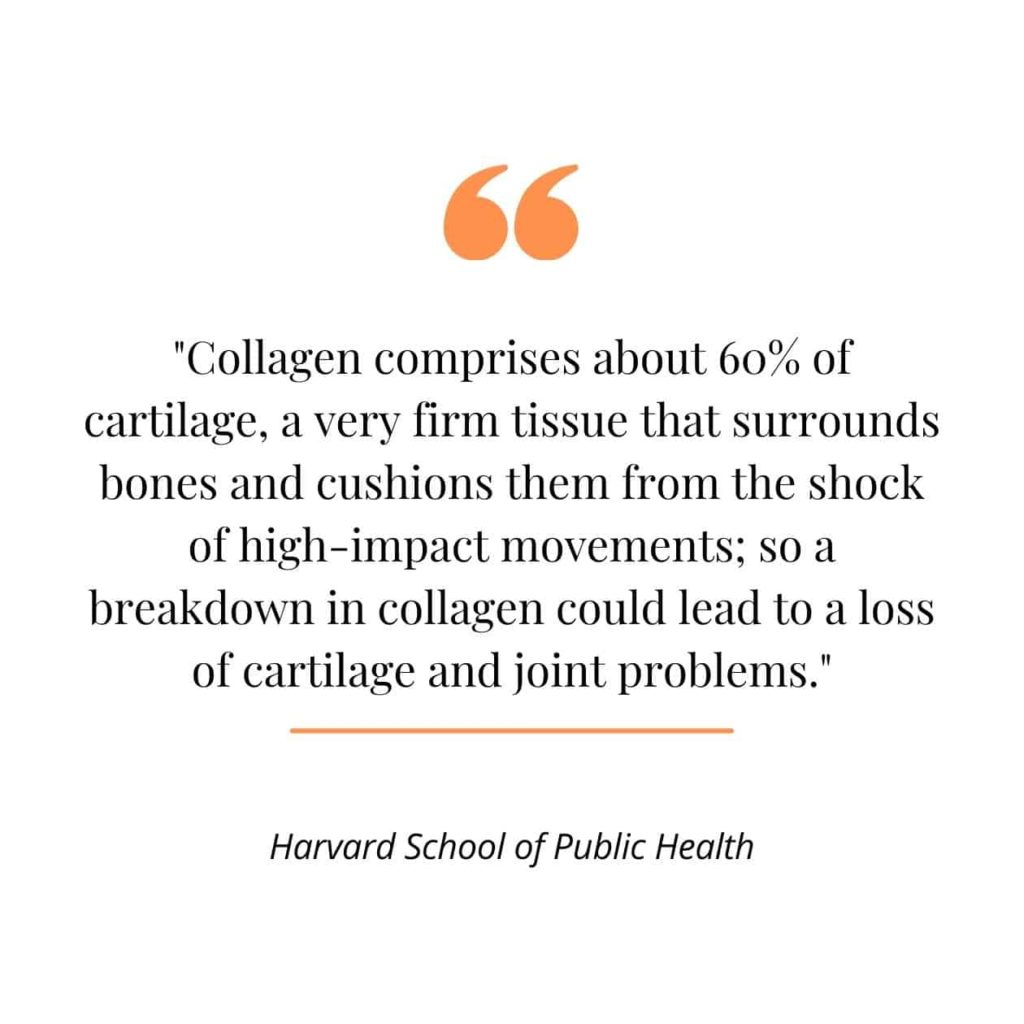
Collagen is a structural protein that forms the basis of connective tissue, such as skin, bones and tendons. It is also found in other body tissues, such as muscles and blood vessels. Collagen provides strength and flexibility to these tissues. It is the most abundant protein in the human body.
Somewhere between the ages of 20 and 30, our bodies begin to produce less collagen. This leads to wrinkles forming in the skin and joints becoming less flexible. It is usually when these signs of aging begin to show themselves that people turn to collagen supplements containing collagen peptides that are known to help counteract this process.
Basically, collagen is an essential protein that helps to keep our bodies looking young and functioning well!
What Are the Different Types of Collagen?
Although there are about 28 known types of collagen, there are four main types of collagen found in the human body: type I, type II, type III, and type IV. Each type is responsible for different functions.
Type I collagen is the most abundant and can be found in the skin, tendons, ligaments, and bones. It provides strength and structure to these tissues.
Type II collagen is found in cartilage and gives it its shock-absorbing properties.
Type III collagen is found in the walls of blood vessels and plays a role in wound healing.
Type IV collagen is found in the epithelial cells that line the body’s internal organs. It forms a barrier that helps to protect these organs from infection.
Together, these different types of collagen work to keep the human body healthy and working properly.
How Much Collagen Should a 70 Year-Old Woman Take?

Regardless of your age, collagen plays a role in improving the appearance of your skin by reducing wrinkles and increasing elasticity. It can also help to strengthen your hair and nails, and it can even reduce joint pain. So whether you are 20 or 70, collagen does what it does!
Back to the question then, how much collagen should a 70 year old woman take? The answer depends on a few factors, such as diet and lifestyle just as it does at any other age. Since many people tend to become less active as they age and studies show that maintaining a healthy diet is a concern for many seniors, these factors do impact recommended doses for each individual.
In general though, most experts recommend that a 70 year old woman should be taking at least 10 grams per day. If diet, exercise or joint pain is a concern, there is room to increase this dosage if need be.
The Benefits of Collagen
Now that we know a little more about collagen and how it supports our bodies, let’s take a closer look at some of the many benefits of collagen and why maintaining healthy collagen levels in our bodies as we age is important.
What is collagen good for? Here are just a few of the reasons many people have added collagen supplements, whether collagen powder, capsules, or liquids, to their wellness regime.
Skin Health
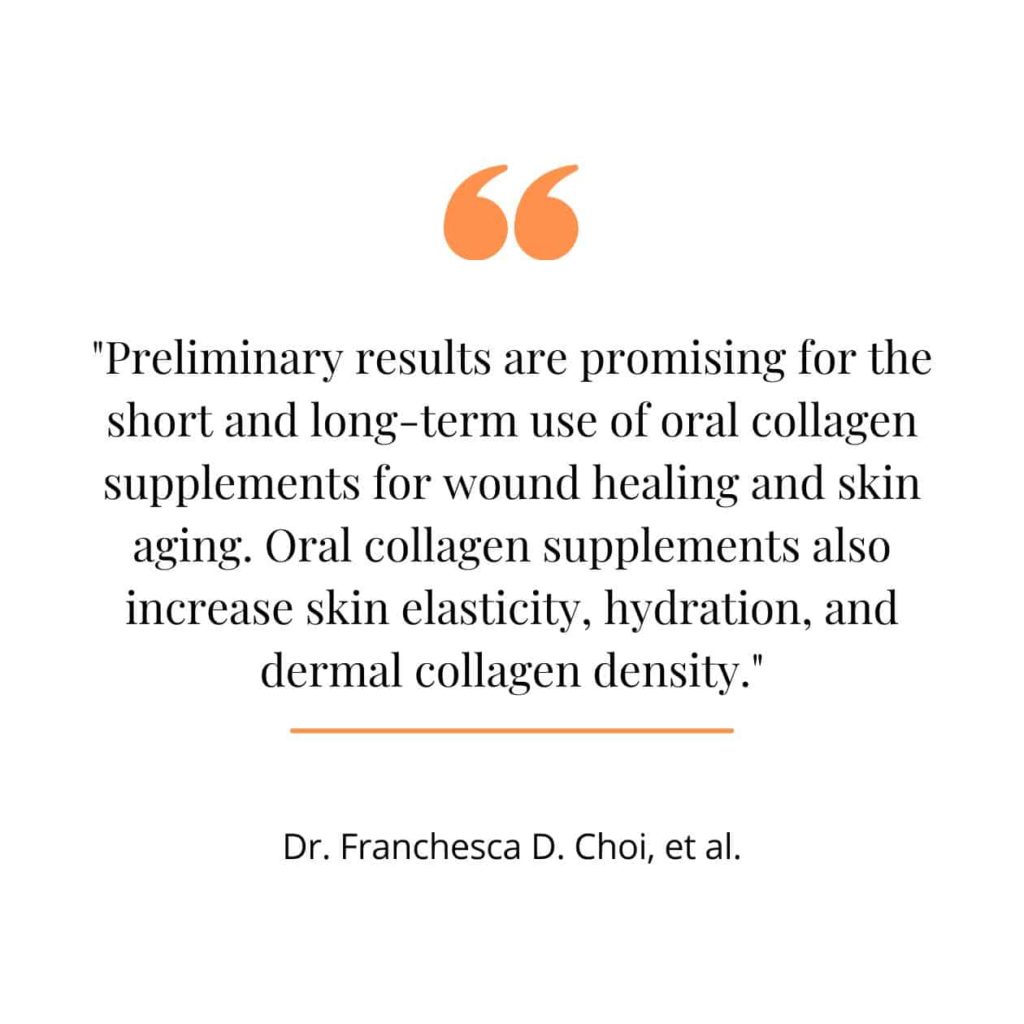
In addition to providing structure and support to our skin, collagen also helps to keep our skin hydrated by attracting and holding water. This means that collagen not only helps to reduce the appearance of fine lines and wrinkles, but it also helps to prevent dryness and flakiness.
Collagen is also needed to help with the healing and regeneration of our skin when we get injured or have a wound.
Collagen is an essential component of healthy, beautiful skin, and there are few better ways to support collagen production than by supplementing with collagen peptides.
Hair Strength
Just like our skin, our hair consists of cells that are held together by collagen. This protein helps to give our hair its structure and strength. Without collagen, our hair would be weak and prone to breakage.
Many people decide to start taking collagen supplements to help improve the health of their hair. These can help to improve hair strength, thickness, and elasticity. They can also help to reduce frizz and split ends.
You might also consider using hair products that contain hydrolyzed collagen. This type of collagen has been broken down into smaller peptides, which makes it easier for the body to absorb. Using products with hydrolyzed collagen can help to replenish the body’s supply of this important protein and improve the strength of your hair.
Gut Health

Collagen is a protein that helps to support the structure of the gut wall. It plays an important role in gut health by helping to keep the barrier between the inside of the gut and the outside world intact. This barrier helps to prevent harmful substances from leaking through and into the body.
Studies show that collagen supports the growth of beneficial bacteria in the gut and helps to regulate inflammation. Taking a collagen supplement daily has been shown to be effective in treating a variety of gut disorders, including leaky gut syndrome, irritable bowel syndrome, and inflammatory bowel disease.
By supporting the structure of the gut and regulating inflammation, collagen can help to improve gut health and promote healing.
Joints & Bones
Collagen plays a vital role in many aspects of our health including bone and joint health. It helps to keep bones strong and to promote the formation of new bone tissue.
Collagen provides support for the cartilage that cushions joints. Without enough collagen, joints can become painful, stiff, weak or even unstable.
We also need collagen to ensure our bones remain strong and dense to prevent them from becoming brittle with age which leads to breaking. Collagen supplementation can help to maintain healthy joints and bones as we age.
Muscles

So how does collagen help with muscles? Well, collagen provides the essential amino acids that our bodies need to build muscle tissue. Collagen is needed to repair and strengthen damaged muscle tissue.
Because collagen provides the building blocks for new muscle growth and keeping existing muscles strong, it is very important to boost our collagen synthesis as we age to avoid muscle loss and weakness.
When Should I Start Taking Collagen?
It’s really never too early or too late to start reaping the benefits of collagen. But, experts in the fields of health and wellness seem to recommend starting the use of collagen supplements in your 20’s.
With lifestyle and environmental stressors in today’s workforce, it is believed that our collagen production begins to decline quickly as we enter the workforce.
Adding collagen peptides through supplements helps with aging and maintaining health as well as boosting the body’s collagen production. Due to the lack of natural collagen synthesis in our bodies in our mid- to late-20s, there’s no time like the present to start reaping the health benefits of a collagen supplement!
Does Collagen Really Work?
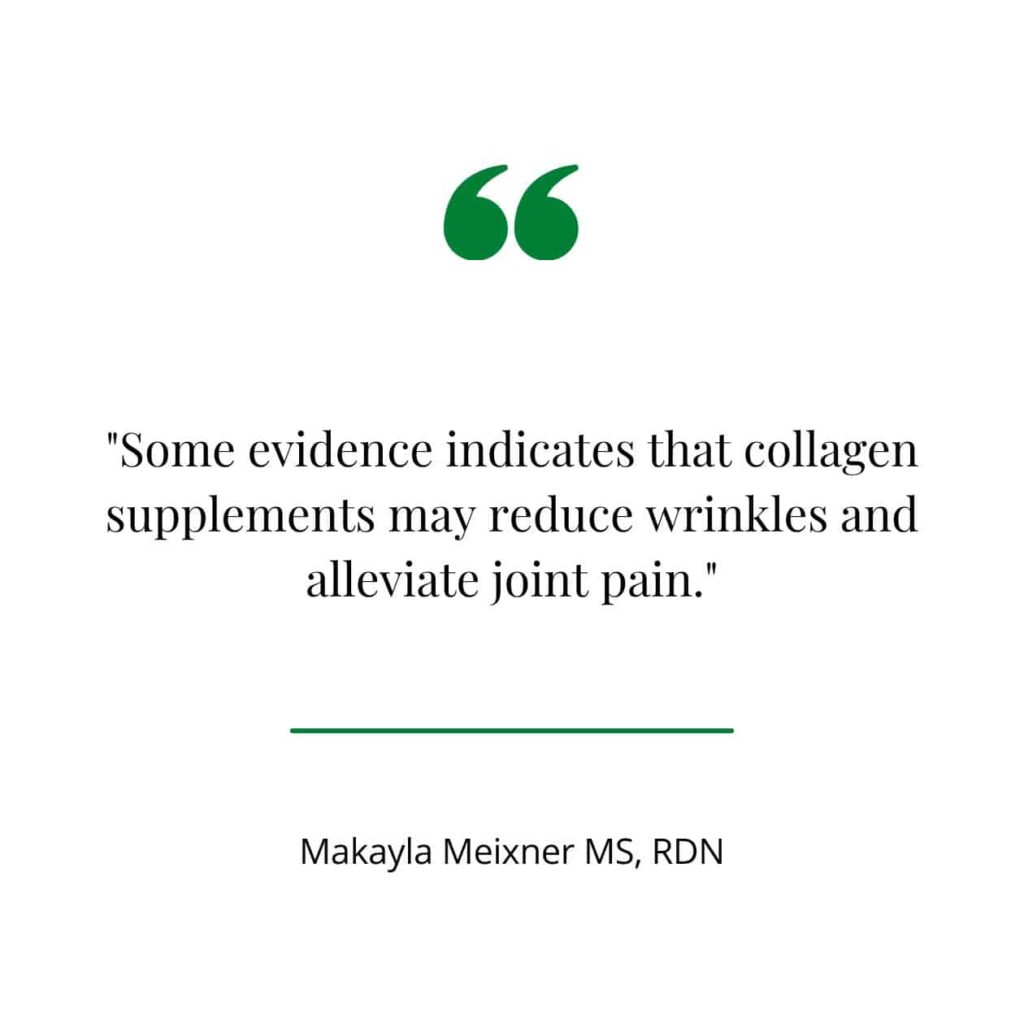
What is collagen good for? Does it really work? Simply put, collagen is good for our overall health and wellness including, but not limited to, skin health, soothing joint pain, and improving muscle mass. Our bodies cannot function without collagen and yes, it does work!
Adding collagen supplements to our diet stimulates our bodies natural ability to produce collagen and thereby helps to maintain our much needed collagen peptides for our body’s structure and functionality.
Is There Such A Thing As Too Much Collagen?
It’s important to remember that you can have too much of a good thing. While collagen is generally considered safe, taking large doses of it may cause some side effects. These can include upset stomach, diarrhea, and bloating. In rare cases, allergic reactions have also been reported.
Beginning with a lower dose is always best to give your body time to accept the product.
When Will I See the Results of My Collagen Intake?
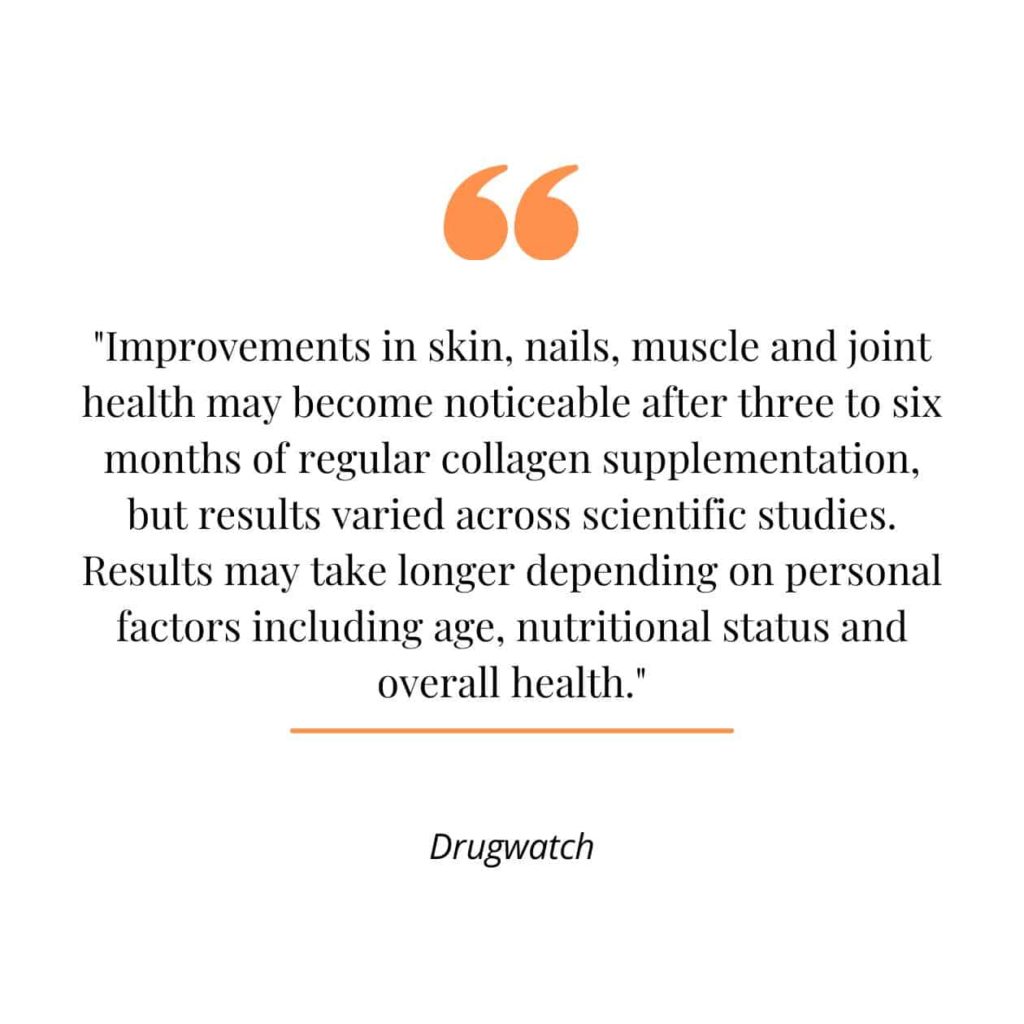
You might start seeing the effects of collagen intake within a few weeks. Some people report seeing improvements in their skin, hair, and nails within this timeframe.
Be patient as it may take up to 6 months for the full effects of collagen to be noticeable. This is because it takes time for your body to synthesize collagen molecules and for these molecules to then be distributed throughout your body.
Can I Naturally Up My Collagen Production?
There are ways to naturally up your collagen production. Here are a few things you can do to give your body the boost it needs to naturally produce more collagen:
- eat foods rich in Vitamin C
- eat more protein
- eating collagen rich foods
- regular exercise
- getting enough sleep
- protect your skin from too much sun exposure
The Bottom Line
As you can see from the above information, collagen is vital to our overall health at any age. We hope you have found our guide ‘How Much Collagen Does A 70 Year Old Woman Need?’ informative. We tried to provide answers to many questions including the most basic, what is collagen good for?
Be sure to also check out our Health BLOG and collagen product page where you will find more information and resources to help you be your healthiest!
Organixx Clean Sourced Collagens blend contains five types of collagen from four sources. What’s more, it’s combined with targeted nutrients such as zinc, vitamin C, and vitamin B6 which specifically enhance the bioavailability and potency of collagen. Clean Sourced Collagens is formulated from the ground up to enhance and support your body’s natural ability to heal and rebuild itself from the INSIDE out.

Video Transcript:
Today’s question comes from one of our viewers asking about collagen for leaky gut. Specifically, this individual says, “A lot of people are taking collagen, but we’re not sure what is the right amount. Can you clarify, for individuals who want to heal leaky gut, how much collagen should we be taking?”
Collagen Supports Digestive Healing
This is a fantastic question because our Clean Sourced Collagens is highly effective at helping you heal the open, leaky junctures – the tight junctures that get opened from digestive imbalances in leaky gut. Collagen can help support that closure of the gut juncture.[1]
How to Microdose with Collagen Supplements
But the best way to consume collagen for leaky gut is actually to do what I call microdosing. So, having a dose in the morning, having a mid-sized dose in the lunchtime zone, and then also right around dinner or maybe even before bedtime. But this allows the collagen to have its most effectiveness throughout the day, so every time you’re dosing it in the smaller microdosing versions or therapeutic doses, that delivers consistent delivery of the healing properties that we need collagen to take effect.
And collagen has this amazing capacity to support, not just our external skin, but our internal skin, and our digestive process, and the shape and the function of our small intestine and large intestine is skin. It’s just internalized, and there’s a mucosal membrane, and the collagen can be really helpful in achieving that.
How to Maximize Collagen Effectiveness
Now, I do recommend also – to maximize the effectiveness of collagen – is to add in our Enzyme 17, and that can be taken about 20 to 30 minutes before you take and consume your collagen. Because the Enzyme 17 has the right enzymes to break down and help your body assimilate the collagen, so you get your max absorption and then max assimilation.
So that is what I recommend for any individuals looking to use collagen to heal leaky gut. So I hope that’s helpful, and please feel free to send us more questions. I love answering your questions and helping support your body through our fabulous products here at Organixx.
Organixx Clean Sourced Collagens blend contains five types of collagen from four sources. What’s more, it’s combined with targeted nutrients such as zinc, vitamin C, and vitamin B6 which specifically enhance the bioavailability and potency of collagen. Clean Sourced Collagens is formulated from the ground up to enhance and support your body’s natural ability to heal and rebuild itself from the INSIDE out.

“Eight studies used collagen hydrolysate, 2.5g/d to 10g/d, for 8 to 24 weeks, for the treatment of pressure ulcers, xerosis, skin aging, and cellulite. Two studies used collagen tripeptide, 3g/d for 4 to 12 weeks, with notable improvement in skin elasticity and hydration. Lastly, one study using collagen dipeptide suggested anti-aging efficacy is proportionate to collagen dipeptide content.”
Dr. Franchesca D. Choi, et al., Oral Collagen Supplementation: A Systematic Review of Dermatological Applications
People are always looking for ways to slow down the aging process, and collagen supplements may be a way to do just that.
Many 50-year old women are turning to this incredible supplement to boost the natural collagen production in their bodies.
Collagen is one of the main building blocks in our skin and other tissues like muscles, joints, blood vessels and bones. As we age, our bodies naturally produce less collagen which can lead to wrinkles or sagging skin.
There are many different brands of collagen supplements on the market, and it can be hard to know how much to take.
The recommended dosage for collagen supplements is anywhere from 2.5-15 grams per day, according to a 2019 review of clinical studies published in the National Library of Medicine, but the dosage may vary depending on the specific supplement.
It is always best to start with a lower dose and increase gradually as needed. So, how much collagen should a 50-year old woman take?
Let’s take a closer look at what collagen is good for, the correct dosage for a middle-aged woman, and the many benefits of taking collagen peptides.
What exactly is collagen?
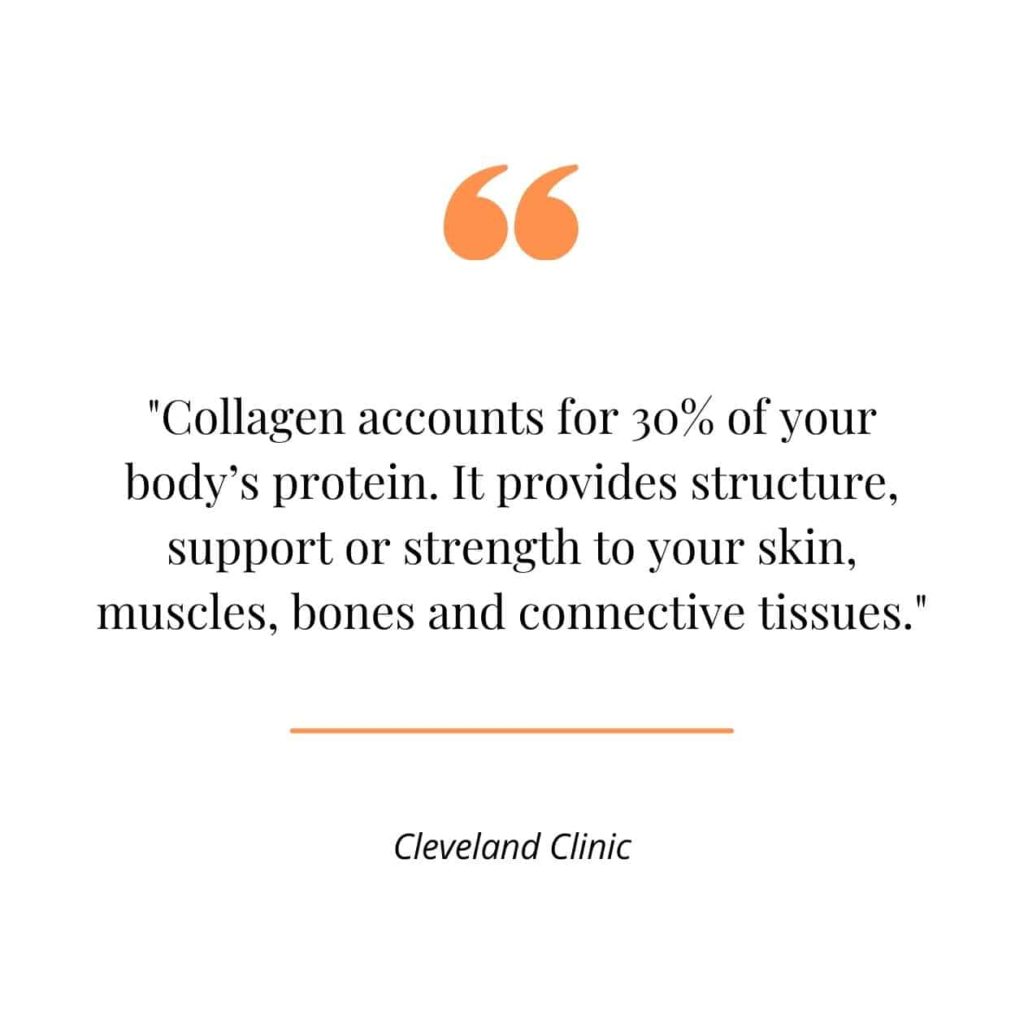
Collagen is a protein that is found in our skin, muscles, joints, tendons, and bones. It is the most abundant protein in our bodies, making up about a third of the protein, and it plays a vital role in how our skin looks and feels.
Collagen peptides are the building blocks of collagen, and they help to keep our skin looking plump and hydrated. But that’s not all that collagen is good for. Along with keeping our skin looking young and healthy, studies suggest that collagen is also responsible for joint health, bone density, and cardiovascular health.
It’s essential for wound healing and helps to repair damaged tissue.
Are there different types of collagen?
There are actually 28 different types of collagen, but 80-90% of the collagen in our bodies is type I, II, III, V, and X.
Research shows that Type I collagen is the most common type of collagen in our bodies and it plays a crucial role in keeping our skin looking young and healthy. It helps rebuild damaged tissue, supports bone health, and encourages wound healing. It’s also been shown to improve joint function and cardiovascular health. Supplementing with type I collagen can help you maintain healthy skin, bones, and joints.
On the other hand, Type II collagen is found in our cartilage and it helps to keep our joints healthy. It’s been shown to improve joint function and reduce pain and inflammation. Supplementing with type II collagen can help you maintain healthy joints.
Type III collagen is found in our skin, muscles, and blood vessels. It’s been shown to improve skin elasticity and reduce wrinkles. Supplementing with type III collagen can help you maintain healthy skin.
Type V collagen is found in our hair, nails, and skin. It helps to keep our hair and nails strong and healthy. Supplementing with type V collagen can help you maintain healthy hair and nails.
Type X collagen is found in our bones and joints. It helps to keep our bones healthy and strong. Supplementing with type X collagen can help you maintain healthy bones.
Each type of collagen is unique and aids a different part of our bodies. However, they all work together to keep us looking and feeling our best!
How much collagen should a 50 year old woman take?

A study published in Nutrients suggests that the recommended dosage of collagen for women in their 50s is 10-15 grams per day. This is because as we age, our bodies produce less and less collagen.
Supplementing with collagen can help to slow down the aging process by boosting the natural collagen production in our bodies.
Collagen Benefits for Women
One of the most combatted effects of aging in women over 50 is wrinkles.
It seems like people will do anything to keep their face looking youthful and smooth for as long as possible, which is why collagen supplements are so popular!
But it’s not just the skin that collagen can benefit, there’s plenty of benefits to taking these supplements.
Let’s take a closer look at just a few of those benefits:
Skin Health
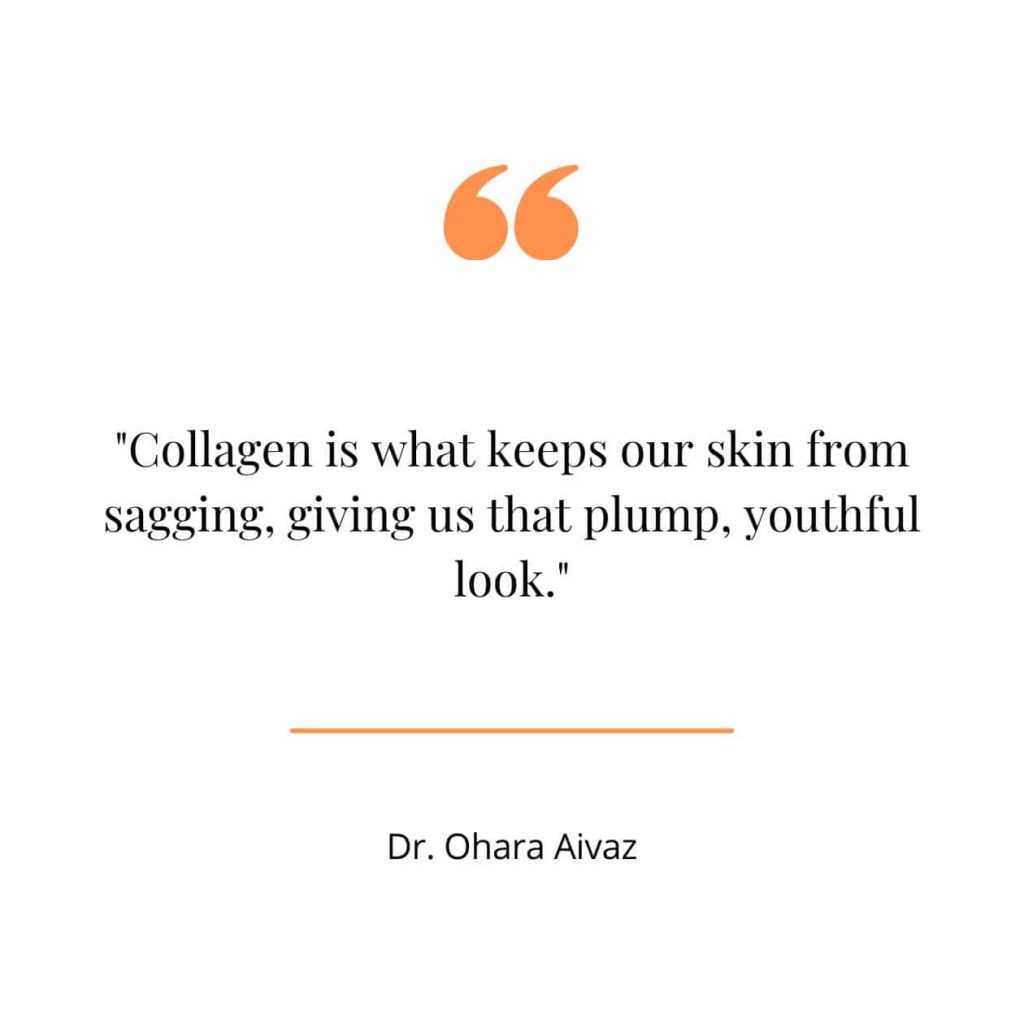
As we age, our skin starts to become thinner and less elastic. This is because of the decrease in collagen production.
Collagen supplements can help to boost collagen production, which can lead to healthier, more youthful-looking skin.
Hair
Collagen is essential for hair health. It helps to keep hair strong and healthy, and it can prevent hair loss and balding as suggested in a 2022 study published in the International Journal of Molecular Sciences.
Collagen supplements can help to boost collagen production in the body, which can lead to thicker, healthier hair.
Joints & Bone
As we age, our joints and bones start to weaken. This is because of the decrease in collagen production.
According to a 2023 study published in PubMed Central, Collagen supplements can help boost collagen production, which can lead to stronger joints and bones and even fewer aches and pains.
Muscles

As we age, our muscles start to become weaker and less flexible. This is because of the decrease in collagen production.
Collagen supplements can help to boost collagen production, which can lead to stronger and healthier muscles.
When should I take collagen?
If you’re noticing any changes in your skin, hair, nails, or joints that you don’t like, it might be a good idea to start supplementing with collagen.
For example, if you’re starting to see wrinkles or your hair is thinning out, collagen supplements could help. If you’re having joint pain or your nails are weak and brittle, collagen could also be a good option.
Collagen could be taken during breakfast. This is because collagen is a protein and it needs to be taken with other protein sources in order to be properly absorbed by the body.
Does collagen work?
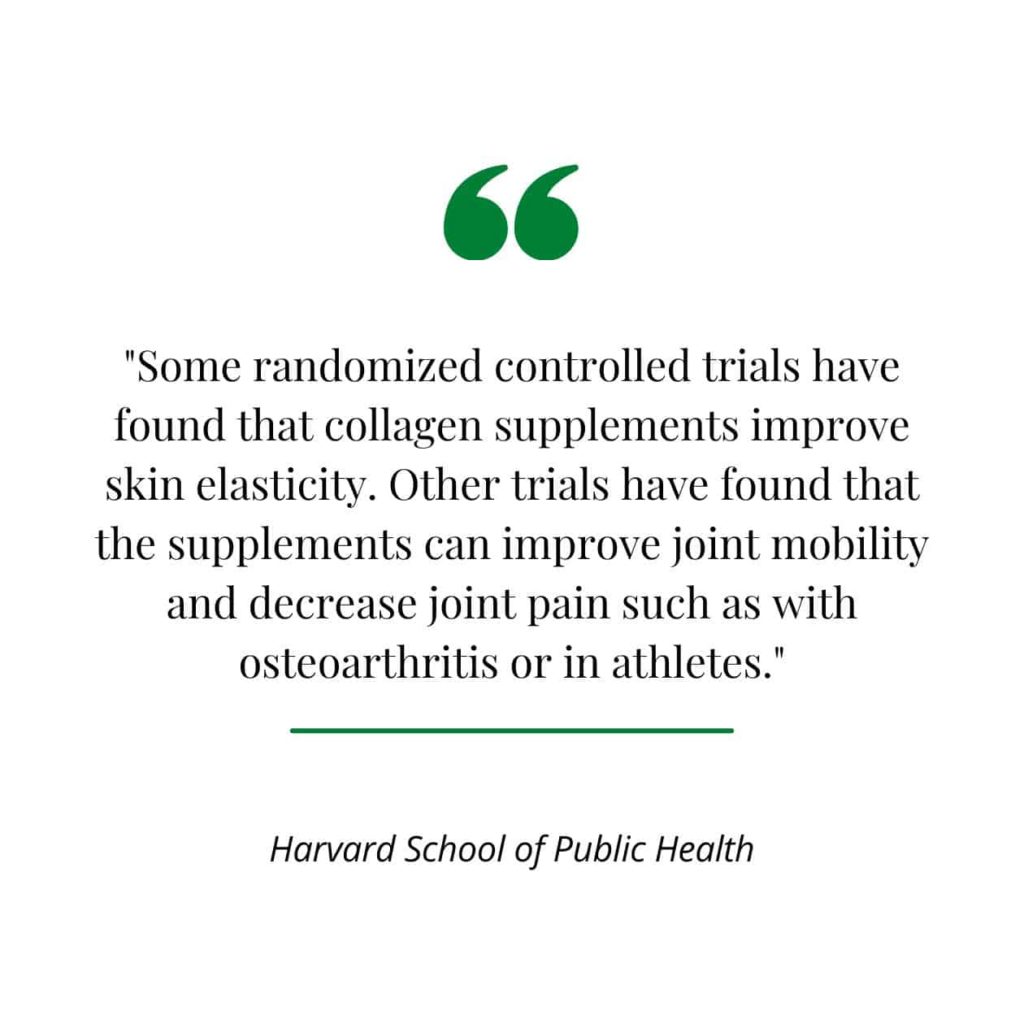
Yes, collagen does work! Supplementing with collagen can help to boost collagen production in the body, which can lead to a number of different health benefits.
That being said, every body is different and will react differently to supplements of any kind. So, just because one person sees immediate results from taking collagen supplements, doesn’t mean you’ll see the exact same results in the exact same timeframe.
How much collagen is too much?
There is no such thing as “too much” collagen, because our bodies will simply excrete any excess collagen that we consume.
That being said, it is possible to experience some mild side effects from taking too many supplements, so it’s always best to start with the recommended dosage and then increase as needed.
How long does it take to see results?
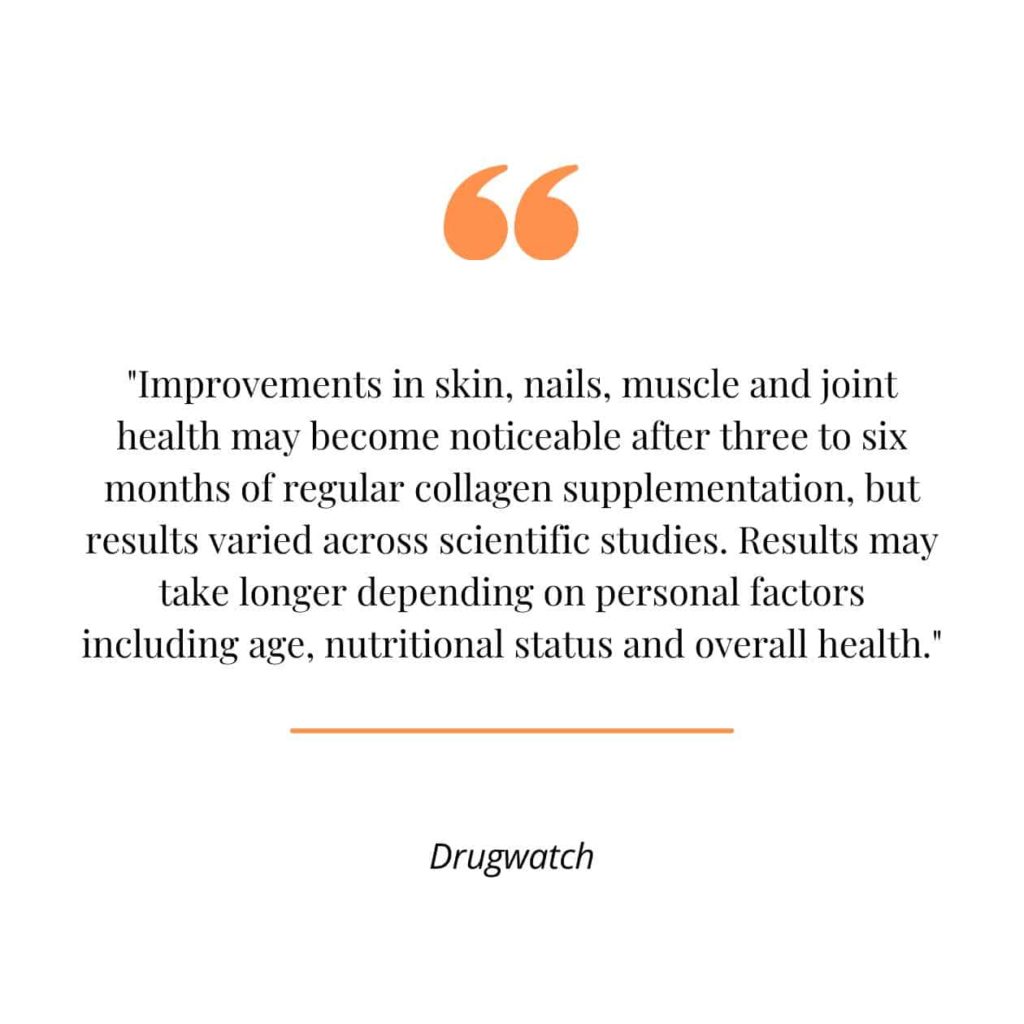
Again, this varies from person to person. Some people may see results in as little as two weeks, while others may not see any results for several months. Just be patient and give it some time!
Why does collagen naturally deplete?
As we age, our bodies produce less and less collagen. This is a natural part of the aging process.
Additionally, certain lifestyle factors can contribute to the depletion of collagen, such as smoking, drinking too much alcohol, and spending too much time in the sun.
How do I get more collagen naturally?

There are a few things you can do to help boost collagen production in your body:
- Eat a healthy diet: Eating a diet that is rich in vitamins and minerals is essential for good health. Make sure to eat plenty of fruits, vegetables, and protein.
- Exercise regularly: Exercise helps to improve circulation and increase blood flow. This can help to deliver nutrients to the cells and promote collagen production.
- Get enough sleep: Sleep is essential for good health. When we sleep, our bodies have a chance to repair and regenerate. Make sure to get at least 7-8 hours of sleep every night.
- Reduce stress: Stress can have a negative impact on our health. Try to find ways to relax and reduce stress in your life.
The Bottom Line
As we age, our collagen production naturally decreases, which can lead to a variety of health problems.
Thankfully, supplements like collagen peptides can help to boost collagen levels and improve overall health.
It’s important to start slowly when taking these supplements and increase dosage as needed in order to avoid any unwanted side effects.
Results may vary from person to person, but most people should start to see some benefits after a few weeks of regular collagen supplementation.
If you’re interested in learning more about collagen, natural health remedies, and organic solutions to a happier, healthier lifestyle, check out our page for more informative articles!
If you’re ready to start your collagen journey today, we have a selection of clean-sourced collagen products to get you feeling and looking your best!
Organixx Clean Sourced Collagens blend contains five types of collagen from four sources. What’s more, it’s combined with targeted nutrients such as zinc, vitamin C, and vitamin B6 which specifically enhance the bioavailability and potency of collagen. Clean Sourced Collagens is formulated from the ground up to enhance and support your body’s natural ability to heal and rebuild itself from the INSIDE out.




